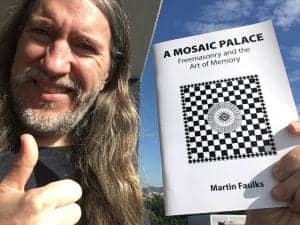Podcast: Download
Subscribe: Apple Podcasts | RSS
 Have you ever thought about how improving your memory can improve your life? Not just surface level, daily routine improvements, but really transform who you are as a person?
Have you ever thought about how improving your memory can improve your life? Not just surface level, daily routine improvements, but really transform who you are as a person?
Did you even realize that memory training makes personal improvement possible?
Or do you limit memory improvement in your mind as merely a tool for remembering dentist appointments and names?
Well, here’s great news:
The art of memory goes far beyond showing up on time and not having to look down at name tags and desk plaques.
With practice, thorough memory training based on a scientifically sound application of the Memory Palace technique will radically transform you.
Not just your outward life and the things you do from day to day.
It will expand the limited notion of what you think your “self” to be.
This outcome isn’t just what the ancient gurus promised, but also the same kind of results respected neuroscientists like Sam Harris are actively promoting in our time.
How is this possible, you ask?
My guest today is memory expert Martin Faulks. He’s also an expert in the field of meditation.
Complimenting his mediation and memory training experiences, Martin’s a martial artist, yoga teacher, and author of over half a dozen books on subjects such as enlightened living and tai chi. His newest book, A Mosaic Palace: Freemasonry and the Art of Memory explores the link between the ancient tradition of memory techniques and the secretive fraternal organization, the Freemasons.
But Martin also takes on fun and unique memory challenges. For example, check out this interesting memory demonstration.
As you can see, you really can incorporate fun activities with personal self-development.
To that end, Martin and I explore memory as an internal transformative art that can change the very core of our being. Martin argues that while in antiquity inner transformation through memory was a common practice, too much of this tradition it has been lost in our modern age. The secret then to restoring this idea lies in your approach to committing to the techniques themselves with carefully chosen goals.
The best part?
It’s possible to have that transformation with a bit of guidance because the keys are already within you. What you seek is attainable, and it is within your means to take control of your own life.
Whether you suffer from anxiety, unhealthy coping mechanisms, constantly feel a sense of failure when it comes to interpersonal relationships, or you find yourself sabotaging your own success you can benefit from the advice Martin so freely gives in our conversation.
All you have to do is click play to learn about:
- Memory training and the potential for learning leading to inner transformation (and how what you put into your consciousness can change who you are).
- How the Renaissance caused the art of memory to become a path of cultivation of virtue instead of simply utilitarian
- How Memory Palaces are useful as a form of meditation
- The impact of adaptive strategies on our personality and coping and life skills
- The hidden ways your mind is trying to help you
- The method in which you learn something affects how easy it is for you to reference it
- Why the church banned texts like the Ars Notoria as a “sorcery version of memory”
- How the memory method of corporeal similitudes is the most powerful way to create associations for memory
- The debate about whether Sherlock Holmes is a figure to look up to (otherwise known as a hero of an extra level of functioning) to when it comes to memory goals
- Comparing and contrasting memory and sorcery, and memory palaces and magic circles
- Why Giordano Bruno was a memory master and “terrible” teacher (yes, we question everything about him in this episode)
- The differences in the definition of a memory master according to various cultures
You can also watch Martin demonstrate Bruno’s memory techniques in this video:
After listening to this interview, you might be wondering…
Should You Read A Mosaic Palace By Martin Faulks?
In my view, absolutely.
Anyone serious about the memory improvement tradition owes it to themselves to read as much about mnemonics as they can.
It’s not just about you, as you’ll discover today. It’s about everyone’s role in preserving knowledge for the good of the whole.
The number of ideas you discover when you focus on continuous study will impact your practice.
A Mosaic Palace provides historical insight, diagrams and multiple Memory Palace Examples that you can translate into powerful Memory Palace training exercises.
For example, Martin’s book inspired me to rethink some of my previously held notions about how the method of loci was used in the past.
Few memory books combine history, philosophy and technique directed at self-realization. In a world cluttered by competition-based books, A Mosaic Palace is a breath of fresh air.
Plus, Martin has more exciting contributions coming. I also can’t wait to read The Hermetic Art of Memory by Alexander Dicsone.
The adventure never ends!
Further Resources on the Web, this podcast, and the MMM Blog:
Scott Gosnell Talks about Giordano Bruno (MMM Blog)
How to Memorize Like Sherlock Holmes with a Mind Palace (MMM Blog)
How to Train Your Memory By Phil Chambers (Book review)
Memory Craft (Discussion with Lynne Kelly)
Related Posts
- A Polyglot Club For Memory Palace Builders
Use this resource to find great foreign language vocabulary words for memorizing in your Magnet…
- Tap The Mind Of A 10-Year Old Memory Palace Master
Alicia Crosby talks to us about how she memorized all of Shakespeare's plays in historical…
- Memory Strategies: 9 Shockingly Easy Ways to Improve Your Memory
What are memory strategies and how do they work? Can they help you achieve your…





4 Responses
Thanks Anthony! There is so much to explore with this topic and it does not seem to have end.
Overall, it is all about memory. If I could compile all the best things about life before I die, it would be like a “Best Places To Go” travel book.
Thanks for checking this one out, Maricela.
That is a book I would like to read. Please do write it!
There were some fascinating ideas in this podcast – like putting people in a memory palace for personal development.
Thanks for the great podcast.
Thanks for checking it out, Andrew. That is a great way to think about it, and I’ve been delighted to learn more about how Masons use the Memory Palace technique in just that way. I had no idea until recently.